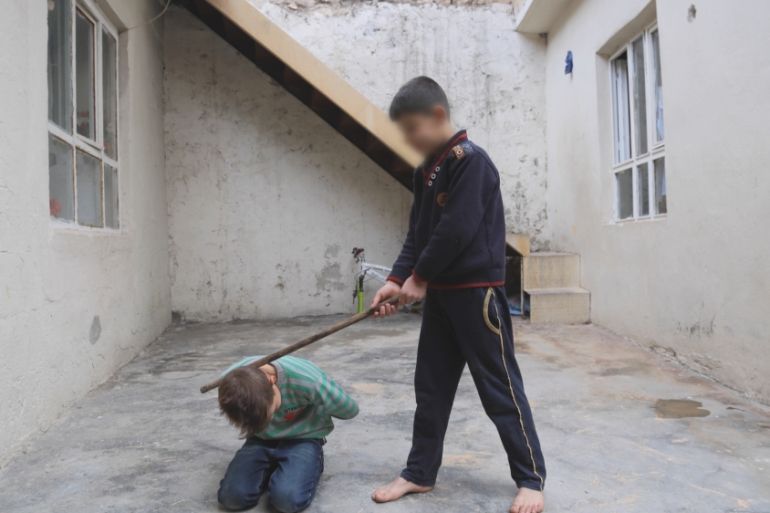
Lion Cubs of ISIL: Children of the Caliphate
Teenagers and young boys as well as their relatives and guardians give testimonies of life and death under ISIL.
Editor’s note: This film is no longer available online.
They are called “ashbal” – the lion cubs of the “caliphate”.
Keep reading
list of 4 itemsMoscow theatre attack suspects show signs of beating in court
Four men showing signs of severe beating charged over Moscow concert attack
Russia mourns Moscow concert hall attack victims as death toll rises to 137
“We were the ‘cleaners’ group,” says Kasswara*, a 16-year-old boy from Raqqa. “Cleaning means slitting the throats of those who belong to the other side and are hiding.”
Kasswara joined ISIL when he was 14 years old. He now lives in Greece after fleeing the group.
“A guy from my area was decapitated by [ISIL] because of me. People had their hands chopped off because of me,” he says.
Boys, teenagers and men who escaped ISIL-controlled cities in Syria give a detailed account of what life is like for children under the Islamic State of Iraq and the Levant group, which is also known as ISIS.
The boys recall their experiences at school, on the streets, at home and in military training camps under ISIL. Testimonies are recorded in secret locations in Turkey, Greece and Germany.
”A
because of me. People had their hands chopped off because of me.”]
Teachers in ISIL-held areas had to change their curriculum completely to suit the agenda of the Islamic State of Iraq and the Levant.
“To teach them to count, they used photos of bombs, pistols and bullets,” says Abou Fourat*, a teacher formerly based in Deir Az Zor and now living in Turkey.
Relatives, including a Free Syrian Army fighter, describe their experiences and ongoing concerns for family members who remain in Syria.
All are trying to come to terms with their experiences as they recall what they saw and what they did living under ISIL.
*Names in this film were changed to protect the identity of the interviewees
![Kasswara, 16, is a former ISIL intelligence officer. He fled the armed group after being sexually abused by a high-placed person in the organisation [Screengrab/Al Jazeera]](/wp-content/uploads/2017/10/f592d859917f4551870eb140172b0725_18.jpeg)
FILMMAKER’S VIEW
By Thomas Dandois
We had the idea for making Lion cubs of ISIL when we were shooting our previous documentary, ISIL, Deserters Speak Out, which contains testimonies of ISIL deserters and the men who helped them escape Syria.
During the shooting, we realised that there was another film to be made. People were telling us that they had seen children in training camps. It took several months for us to make contact, to find children who had managed to flee and who agreed to speak.
Most people did not want to talk. It took time for us to gain their trust. Of course, we did not ask parents and children straightaway to tell us about what they had to live through. At first, we’d talk about daily life, school. We’d play with them, have a meal, talk about the situation in Syria – make a lot of small talk.
We met the children several times without a camera, without forcing any answers. Most of our appointments got postponed. Many were cancelled. We had, for example, met an eight-year-old boy who had been a singer for ISIL, but overnight, he disappeared. His parents were no longer answering the phone. Their house was deserted. They almost certainly got scared.
ISIL pursues these families beyond the borders. One of the teenagers we portray in the film, Kasswara, received indirect threats. His brother got a message from ISIL saying they know he lives in Greece and that they have sleeper cells there.
The testimonials are very strong, but we did not want to focus only on causing an emotional response. Indignation wasn’t enough. We wanted to understand the process, how these children were organised. So we also met some adults: teachers, fighters, parents. They allowed us to better understand the process of bringing in as many children as possible.
Within ISIL-held areas, the group terrorises the parents, who end up staying confined at home. As a result, only children are out on the streets to play. This way, they are easier to approach.
By closing schools, banning television and music – except for propaganda songs – ISIL are depriving them of any kind of distraction.
A teacher, Abdou Fourat, explained to us how he tried to keep the children away from the recruiters by taking them to play football or swim in the river. It was a way for him to prevent them from falling into the traps of ISIL. War has revealed him as an ordinary hero. He, too, had to flee because staying in Syria was no longer tenable.
Our film is based on interviews. The words are important. We did not want to use propaganda videos because we think it is often counterproductive. Even if you use them to denounce ISIL, it helps spread propaganda.
We chose to broadcast only one such sequence, where a four-year-old boy executes a man. The kid can hardly hold the weapon with his little hands. This extract seemed relevant because it is nightmarish. The situation is beyond comprehension.
These testimonies show us in what darkness the human soul can fall. Kasswara told us he slaughtered people, witnessed the death of one of his friends thrown from a silo, had his own brother arrested after denouncing him. He had to become a victim himself to realise what he had gotten into and run away.
Today, Kasswara is a refugee, alone in Greece. He had never spoken of what had happened to him.
Beyond showing this film on television and online, we would like schools to seize this documentary. Between the lines, this film says: “This is what you ISIL are selling and this is reality. Listen to what these children had to live through.”